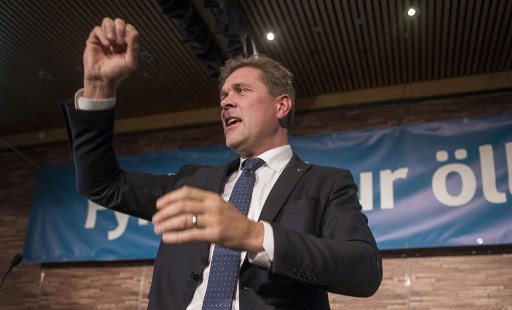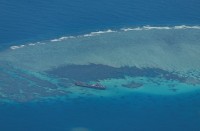
/ AFP / Halldor Kolbeins/
REYKJAVIK, Iceland (AFP) – Iceland’s president launched talks Monday to determine who could form the next government after an inconclusive general election in which a record eight political parties won seats.
Prime Minister Bjarni Benediktsson called the snap election a month ago after a junior member of his center-right coalition quit over a legal scandal involving Benediktsson’s father.
Growing public distrust of the elite in recent years has spawned several anti-establishment parties, splintering the political landscape and making it increasingly difficult to form a stable government.
None of the record eight parties that won seats in parliament in Saturday’s vote came close to obtaining a majority, and both the right-wing and the left-wing want a chance to form the next government.
No statement was released after President Gudni Johannesson wrapped individual talks with all the party leaders around 1730 GMT, and no date was set as to when Johannesson might announce his pick.
Benediktsson, whose conservative Independence Party came out on top — though with just 16 of 63 seats — was first out to meet with the president.
Exiting the talks, Benediktsson, whose party has been the main political force in Iceland for decades, said he had told Johannesson he was ready to build a new government.
“I told the president that the Independence Party is ready to try to form a government and is willing to assume responsibility,” he told public broadcaster RUV.
Tainted by scandals
However, he signaled that he may need more time as “other groups might need more room before attempting to try it.”
Benediktsson is being challenged by the Left Green Movement and its potential allies, the Social Democratic Alliance and the anti-establishment Pirate Party.
Under the Icelandic system, the president, who holds a largely ceremonial role, usually tasks the leader of the biggest party with trying to put a government together.
But Benediktsson and his party have been tainted by scandals in recent years, and the party lost almost a quarter of its seats in parliament in the vote.
As a result, the president could decide to ask the leader of the Left Greens, Katrin Jakobsdottir, to form a government.
The Left Green Movement came in second with 11 seats, the Social Democratic Alliance obtained seven seats, and the Pirates six seats. They would need a fourth partner to hold a majority.
Regardless of who receives the mandate, it could take days, weeks or even months before Iceland has a new government in place as thorny coalition negotiations await.
A coalition of at least three, or four or five parties would be needed to obtain a majority in parliament.
Jakobsdottir, who vowed during the election campaign to spread Iceland’s economic prosperity to the health care and education sectors, said meanwhile she should be given the opportunity.
“We have eight parties in parliament and right now, there doesn’t seem to be any obvious majority. All parties are open for discussion,” she said.
© Agence France-Presse







